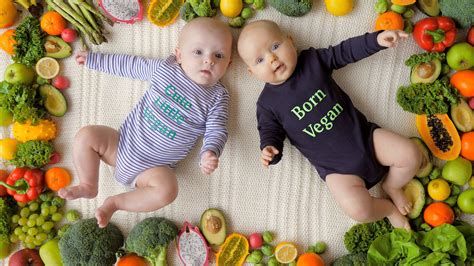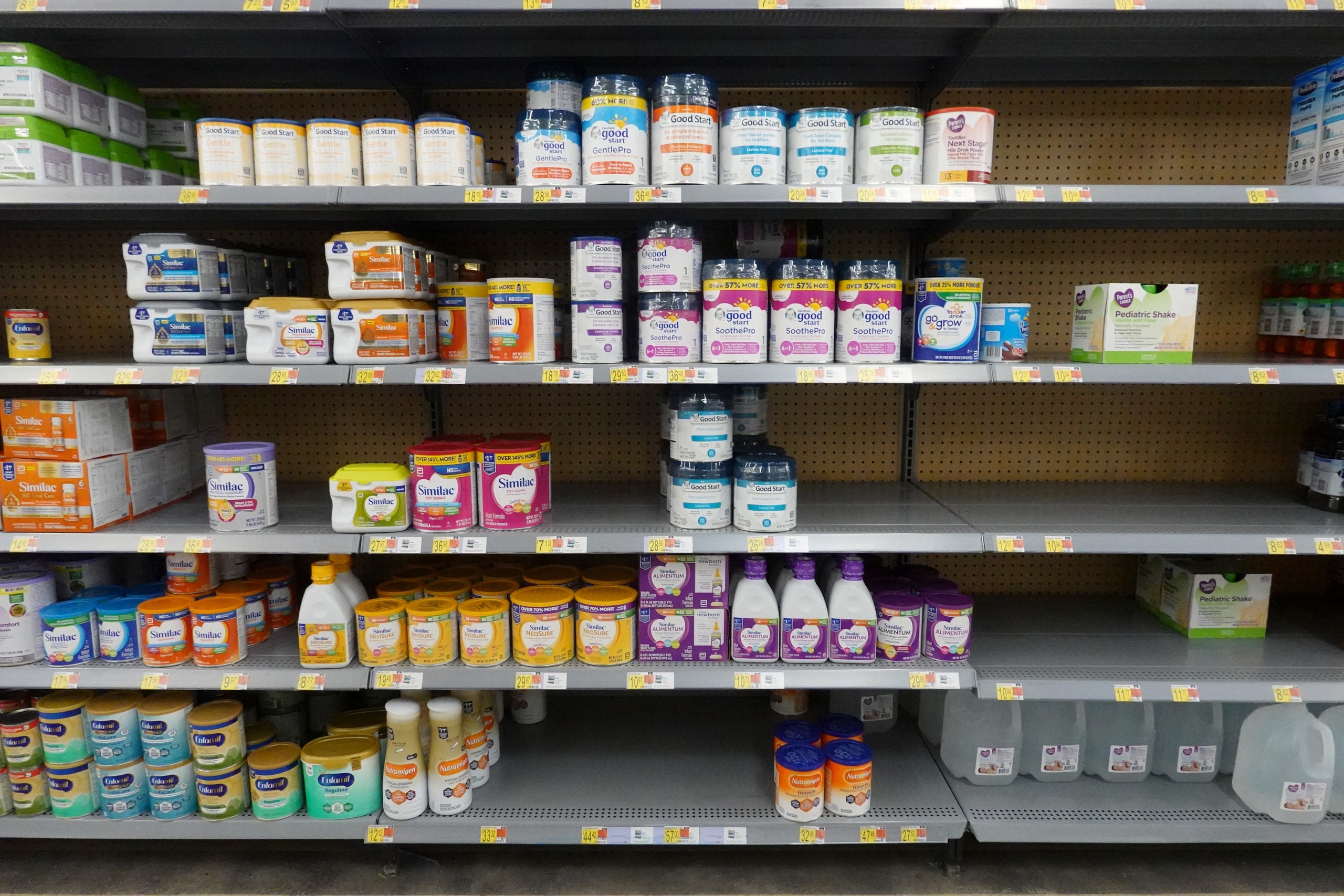 Are you wondering if homemade vegan baby formula is a safe and healthy alternative to commercially available options? While it may seem like a perfectly logical choice if you’re following a plant-based or dairy-free diet, there are some serious drawbacks and potential risks involved. Here’s what you need to know before you decide to go the homemade route.
Are you wondering if homemade vegan baby formula is a safe and healthy alternative to commercially available options? While it may seem like a perfectly logical choice if you’re following a plant-based or dairy-free diet, there are some serious drawbacks and potential risks involved. Here’s what you need to know before you decide to go the homemade route.
In recent years, there has been an increasing trend in parents opting for homemade formulas, especially those who are vegan or have dietary restrictions. The idea behind homemade formulas is that they can provide the same nutritional benefits as commercial formulas, but without the use of animal products. However, experts at Nemours, a children’s health system, strongly advise against using homemade formulas because they may not provide the necessary nutrients that infants need for proper growth and development.
The main issue with homemade vegan formulas is that they are typically plant-based and plant-only. While plants can provide essential vitamins and minerals, they may not be sufficient in the amounts needed by infants. Homemade formulas also often lack the appropriate balance of nutrients, such as protein and fats, which are crucial for a baby’s development. In addition, homemade formulas may not be properly labeled or regulated, so there is a risk of contamination with harmful substances like heavy metals.
Furthermore, homemade vegan formulas may not contain the necessary amounts of certain nutrients, such as calcium and vitamin B12, which are commonly found in dairy-based formulas. Infants need these nutrients for long-term health and to support their growing bones and nervous system. Without an adequate supply, infants may be at risk of deficiencies that could lead to serious health issues.
Another concern with homemade formulas is the risk of foodborne illnesses. The powdered plant-based ingredients used in homemade formulas may not be as safe as commercially available formulas, which are subjected to rigorous testing and quality control measures. There have been cases of infants being hospitalized due to infections and illnesses caused by homemade formulas.
It’s important to note that breastfeeding is still the gold standard when it comes to infant nutrition. Breast milk provides a unique combination of nutrients that no other food or formula can replicate. If breastfeeding is not an option, it is best to consult with a pediatrician or a registered dietitian to find a suitable commercial formula that meets your baby’s nutritional needs.
In conclusion, while the idea of homemade vegan baby formula may be appealing to some parents, the drawbacks and risks far outweigh any potential benefits. Infants require a specific balance of nutrients for optimal growth and development, and homemade formulas may not provide this. It’s crucial to prioritize your baby’s health and well-being and opt for a commercially available formula that has been formulated to meet their nutritional needs.
Contents
Homemade Vegan Baby Formula Warning
Are you considering homemade vegan baby formula for your child? While there are many benefits to a vegan diet, it’s important to understand the potential drawbacks and risks associated with homemade formulas.
Firstly, it’s important to note that commercial baby formulas are nutritionally well-designed to meet the needs of infants. They contain a balanced mix of nutrients such as proteins, fats, carbohydrates, vitamins, and minerals that are vital for a baby’s growth and development. Homemade formulas, on the other hand, may lack these optimal nutrients.
Most homemade vegan baby formulas mainly rely on plant-based sources such as rice or grains. While these alternatives are popular among some parents, they may not provide enough essential nutrients like fat, proteins, and certain vitamins and minerals that are crucial for a baby’s healthy growth.
One of the main concerns with homemade vegan formulas is the risk of inadequate calorie intake. Babies need a certain amount of calories for healthy growth and development, and homemade formulas may not contain enough calories to meet these needs.
Additionally, homemade vegan formulas may contain ingredients that are not suitable for infants. For example, some recipes include syrups or sweeteners that can be harmful to a baby’s developing digestive system. Furthermore, these formulas may contain high levels of isoflavones, which are plant compounds that can have hormonal effects in the body. The long-term effects of these compounds on infants are not well-researched.
Another important consideration is the increased risk of nutrient deficiencies. Homemade formulas may not contain enough essential nutrients like iron, vitamin B12, and calcium. These nutrients are important for a baby’s health and development, and deficiencies can lead to serious health problems.
It’s crucial to keep in mind that infants have different nutritional needs compared to adults or older children. While a vegan diet can be healthy for adults, it may not provide the necessary nutrients for optimal growth and development in infants.
If you’re considering a homemade vegan formula for your baby, it’s essential to consult with a pediatrician or a registered dietitian who specializes in pediatric nutrition. They can provide guidance and ensure that your baby’s nutritional needs are met.
In conclusion, homemade vegan baby formulas may not be the ideal choice for your baby’s nutrition. Commercial formulas are scientifically designed to provide the necessary nutrients for healthy growth and development. If you want to follow a vegan diet with your baby, work with a healthcare professional to find suitable options that ensure your baby receives the essential nutrients they need.
Hospitalizations and Risks
Hospitalizations are a serious concern when it comes to homemade vegan baby formula. The lack of proper nutrition in these homemade formulas can lead to serious health issues for children. Although homemade vegan formulas have become popular among parents who want to raise their babies on plant-based diets, they may not be providing the essential nutrients that infants need for optimal growth and development.
Commercial infant formulas that are made with dairy-free sources, such as soy-based formulas, are formulated to meet the nutritional needs of infants. They contain a balanced mix of proteins, fats, carbohydrates, vitamins, and minerals. The formulas are carefully regulated and labeled to ensure that they meet the necessary standards for infant nutrition.
On the other hand, homemade vegan formulas often lack essential nutrients that are vital for a baby’s growth and development. They may be heavy in certain nutrients such as vitamins and minerals, while lacking others. This imbalance can lead to adverse health outcomes for babies, including poor growth, developmental delays, and other serious health issues.
One thing that parents should know is that breastfed infants receive all the necessary nutrients through breast milk, which is the ideal source of nutrition for babies. If a mother’s diet is well-balanced and provides adequate nutrition, breast milk will contain everything the baby needs. However, if a mother follows a vegan diet, it is important to ensure that she is getting all the necessary nutrients to support her baby’s growth.
Some parents may believe that homemade vegan formulas can be an effective alternative to commercial formulas. However, the risks associated with homemade formulas outweigh any potential benefits. The lack of proper nutrition in homemade formulas can have serious consequences for a baby’s health and development.
In conclusion, homemade vegan baby formulas may seem like a good idea for parents who want to avoid animal products and provide their babies with plant-based diets. However, it is crucial to recognize the risks associated with these homemade formulas. It is recommended to consult a healthcare professional for proper guidance on infant nutrition, rather than relying on misinformation from non-experts.
Disclaimer: This transcript is intended for informational purposes only and should not be considered medical advice. Always consult with a healthcare professional before making any decisions regarding your baby’s nutrition and health.
Ingredients and Nutritional Requirements
When it comes to choosing a baby formula, parents have several options. While commercially available formulas have been nutritionally tested and are considered safe, some parents may consider homemade vegan alternatives. It is important, however, to understand the nutritional requirements of infants and the potential risks associated with homemade formulas.
Commercially available formulas are designed to provide the ideal nutrition for infants. They are formulated to mimic the composition of human breast milk and come in various brands and types, such as dairy-based or soy-based. Soy-based formulas are a popular alternative for infants who have dairy allergies or whose parents follow a vegan lifestyle.
Soy-based formulas contain plant-based proteins, fats, and carbohydrates that meet the nutritional needs of infants. However, it is important to note that soy-based formulas can contain isoflavones, which are naturally occurring compounds that mimic the effect of estrogen in the body. Some research suggests that high levels of isoflavones in an infant’s diet may have long-term effects on growth and development. Additionally, soy-based formulas may contain trace amounts of metals and environmental contaminants.
The Pros and Cons of Homemade Vegan Baby Formula

Making your own vegan baby formula at home may seem like a good choice for some parents. However, it is crucial to understand the risks and nutritional requirements before opting for homemade formula.
Homemade vegan formulas often rely on plant-based sources such as soy milk or nut milk as a base. While these alternatives can provide the necessary calories and some nutrients, they may not meet all the nutritional needs of infants. Babies have specific nutritional requirements that are essential for their growth and development, and commercial formulas are designed to meet these needs. Homemade formulas may lack certain essential vitamins and minerals that are present in commercial formulas.
Another consideration is the potential for contamination and improper ingredient ratios when making homemade formula. Without proper labeling and quality control, it is difficult to ensure that the homemade formula meets the necessary standards for infant nutrition.
What Parents Should Know
Before making any changes to an infant’s diet, it is important to consult with a healthcare professional, such as a pediatrician or a registered dietitian specializing in infant and child nutrition. They can provide valuable information and guidance when it comes to selecting the best formula for your baby’s specific needs.
If parents choose to follow a vegan lifestyle and want to provide a vegan diet for their baby, there are commercially available vegan formulas that are nutritionally complete and safe for infants. These formulas are specifically labeled as suitable for infants and provide all the necessary nutrients for proper growth and development.
While homemade vegan baby formulas may seem like a good choice for some parents, the risks and potential nutritional deficiencies associated with them must be carefully considered. It is important to prioritize the health and well-being of the infant by ensuring they receive proper nutrition from a formula that has been tested and approved for infant consumption.
Here’s a quick summary:
- Commercial formulas are nutritionally tested and considered safe for infants.
- Soy-based formulas are a popular alternative for babies with dairy allergies or vegan parents.
- Homemade vegan formulas may not provide all the necessary nutrients for infants.
- Consult a healthcare professional before making any changes to an infant’s diet.
- Commercially available vegan formulas can provide a safe and nutritionally complete alternative.
Controversy and Criticism
There has been a great deal of controversy and criticism surrounding the use of homemade vegan baby formulas. While some parents may choose to forgo traditional, commercially-available formulas due to concerns about animal-derived ingredients or dietary restrictions, it is important to consider the potential risks and drawbacks of homemade alternatives.
One of the main concerns with homemade vegan baby formulas is the proper balance of essential nutrients, such as protein, fat, and minerals. While fruits, vegetables, and plant-based sources can provide many of these nutrients, it can be challenging to ensure that a homemade formula provides all the necessary components in the right amounts, especially for newborns and young children who require optimal nutrition for growth and development.
Research has also raised questions about the long-term effects of plant-only formulas. Some studies suggest that soy-based formulas, which are commonly used as an alternative to animal-derived formulas, may contain high levels of isoflavones, which can mimic estrogen in the body and potentially have hormonal effects. Moreover, there is a lack of research on the long-term effects of a strictly plant-based diet in infants and children, making it difficult to determine the overall benefits and risks.
In addition to nutritional concerns, there is also a risk of misinformation and misinterpretation when it comes to homemade vegan baby formulas. While some parents may believe that a plant-based diet is inherently healthier, it is important to recognize that not all vegan options are created equal. The effectiveness and safety of homemade formulas may vary depending on the ingredients used, and there is always a possibility of introducing contaminants or pathogens if proper hygiene and food handling practices are not followed.
Moreover, it is worth noting that commercial infant formulas undergo rigorous testing and adhere to strict guidelines to ensure that they meet the nutritional needs of infants. These formulas have been carefully formulated to mimic the composition of breast milk as closely as possible, providing a balanced and complete source of nutrients for growing babies.
While it is understandable that some parents may want to avoid animal-derived ingredients or follow a plant-based lifestyle, it is essential to consult with healthcare professionals before making any significant dietary changes for your baby. They can provide guidance on suitable alternatives and help assess the potential risks and benefits of homemade formulas. Ultimately, the health and well-being of your little one should be the priority, and ensuring they receive adequate nutrition is crucial for their growth and development.
In summary, while homemade vegan baby formulas may seem like a perfectly viable option for those who want to avoid animal products, it is important to be aware of the potential risks and drawbacks. The main challenge lies in providing a balanced and nutritionally adequate formula that meets the needs of growing infants. Before considering homemade alternatives, it is advisable to consult with healthcare professionals and explore other commercially-available vegan formula options that have been specifically designed to provide the necessary nutrients for your baby’s optimal growth and development.
| Pros | Cons |
| – Avoids animal-derived ingredients | – Potential nutritional imbalances |
| – May suit dietary restrictions or preferences | – Lack of long-term research on plant-only diets |
| – Provides an alternative for those who want to avoid soy | – Risk of misinformation and improper formulation |
| – Free from added sugars and other additives | – Potential for introducing contaminants or pathogens |
| – Can be more cost-effective | – Lack of standardized guidelines |
Expert Recommendations
When it comes to choosing the right formula for your baby, experts recommend sticking to commercially available infant formulas. Homemade vegan formulas, such as soya-based formulas, may not provide all the necessary nutrients that newborns and infants need for healthy development.
Commercially available infant formulas are specifically formulated to meet the nutritional needs of babies. They are carefully balanced to provide the right amount of proteins, fats, carbohydrates, vitamins, and minerals that are essential for growth and development.
Plant-only diets, including vegan diets, can be nutritionally adequate for adults and older children. However, it is important to note that babies have different nutritional needs, and a plant-only diet may not provide all the necessary nutrients for their optimal growth and development.
Animal-derived formulas, on the other hand, meet these nutritional needs. They provide essential amino acids, fatty acids, and other important nutrients that are critical for a baby’s healthy growth.
Formulas that are labeled as “hydrolyzed” or “partially hydrolyzed” offer additional benefits. Hydrolyzed formulas have proteins that are broken down into smaller pieces, making them easier to digest. These formulas are recommended for babies who are at a higher risk of developing allergies or have trouble tolerating regular formulas.
It’s always best to consult with a healthcare professional or pediatrician before making any changes to your baby’s diet. They can provide guidance on the best options for your baby’s specific needs and ensure that they are getting the necessary nutrients for healthy growth and development.
Remember, raising a vegan baby or choosing plant-based options for your baby can be done safely with proper guidance and nutrition education. It’s important to ensure that your baby’s diet is balanced and includes a variety of foods to meet their nutritional needs.
